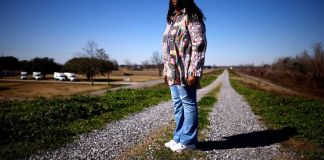By Megan Sayles
AFRO Staff Writer
msayles@afro.com
When West Baltimore resident Tahera Arrington first heard about Amtrak’s Frederick Douglass Tunnel Program, an infrastructure project to modernize a 10-mile stretch of the Northeast Corridor and replace the deteriorating Baltimore and Potomac Tunnel, she thought it wouldn’t be long before a knock came to her door.
She saw Amtrak representatives speaking with residents on the even side of her block on N. Payson Street. Soon, houses on the even side were boarded up, and her neighbors were moving out.
“Construction started really quickly. I don’t remember getting any notice— no paperwork, no one coming and knocking on doors,” said Arrington.
That was more than a year ago, and since then, Arrington’s life and her home have been upended by the project. Early in the development, dust and debris from nearby demolitions made it difficult for her son, who has asthma, to breathe. The constant noise and vibrations that rattled her windows during the day made it impossible for Arrington, who worked nights, to sleep.
She said the construction has also brought an unexpected influx of cockroaches and waterbugs, forcing her and her neighbors to regularly exterminate. Her utilities have been disrupted as well.
On top of the physical and environmental problems, the project has impacted Arrington financially and professionally. She had invested more than $15,000 into finishing her basement— only to have water seep in and cause damage. The noisy construction left Arrington exhausted, and in March, she was fired after unintentionally falling asleep during a work break.
“It’s been really, really hard. Amtrak’s communication sucks. It’s terrible,” said Arrington. “Just a couple weeks ago was the first time I received a letter saying that they are willing to give us an offer on the home. They want to send someone to appraise it, but I’ve been explaining to them that now the value of my home has decreased.”
When the AFRO reached out to Amtrak for comment, a spokesperson said the corporation is committed to being a good community partner as the project progresses.
“We hold our contractors accountable, which includes oversight to ensure that work is performed in accordance with planned noise and vibration limits,” said W. Kyle Anderson, spokesperson for Amtrak. “In the event of a property claim, our outreach team will transfer the information to the claims group to investigate and maintain contact with the community member.”
Amtrak noted that about 50 percent of eligible property owners in the project’s impact zone agreed to preconstruction surveys, which were designed to document the condition of their homes before work began. For residents on the 900 and 1000 blocks of N. Payson Street, the corporation said it recently received federal approval to offer voluntary relocation and has begun notifying homeowners.
As part of the process, residents can choose between a full interior inspection or a “curbside” appraisal that evaluates the property from the outside only.
Beyond her concerns about her home’s appraisal, Arrington said it’s also hard to cope with the idea of being uprooted from her community. She moved to the Edmondson Village neighborhood when she was seven years old, and she’s owned the N. Payson Street property since 2018.
Arrington said she fears she won’t ultimately benefit from the economic growth generated by the project, despite her being a long-time resident who has invested years of time, money and care into her home and community.
“Honestly, I don’t want to move out of the community. Even though this project is going to take 10 years, I don’t want to lose my home,” said Arrington. “If I don’t qualify for relocation, I won’t be able to buy in this community again, and I won’t be able to benefit from [the project] 10 years down the line when the neighborhood value does go up.”
Arrington is just one in a group of Edmondson Village and other West Baltimore residents who are being represented by the Community Law Center (CLC), a Baltimore-based legal services organization.
In January, CLC joined forces with the Environmental Law Clinic of the University of Maryland Francis King Carey School of Law to file a discrimination case against Amtrak, arguing that the planning and construction of the Frederick Douglass Tunnel Program has disproportionately harmful impacts on predominantly Black neighborhoods in West Baltimore.
Amy Petkovsek, executive director of CLC, explained that Edmonson Village has been the most affected by the project because major construction has not begun in other neighborhoods yet. Children are unable to play outside, homeowners are worried about their properties collapsing and cracks have formed on the sidewalks.
“The whole neighborhood has been tremendously disrupted. I’ve been out there a lot, and it’s very apparent that this work is tearing apart the neighborhood. It’s not one day or two weeks of construction— this is a multi-year project,” said Petkovsek. “Residents who were renting have left or are leaving. There’s no sense of neighborhood. Kids can’t play in the streets or on the sidewalks.”
Going forward, she said CLC’s primary focus will be protest, advocacy and legal action to get their clients relocated.
“The construction is still ongoing. We may file additional court action, but we’re also having an awareness campaign to let everybody know what’s really going on in that neighborhood and hoping that that itself shames Amtrak into action,” said Petkovsek. “These folks have to be relocated. They cannot be expected to live there during this.”
Great Job Megan Sayles AFRO Staff Writer & the Team @ AFRO American Newspapers Source link for sharing this story.




